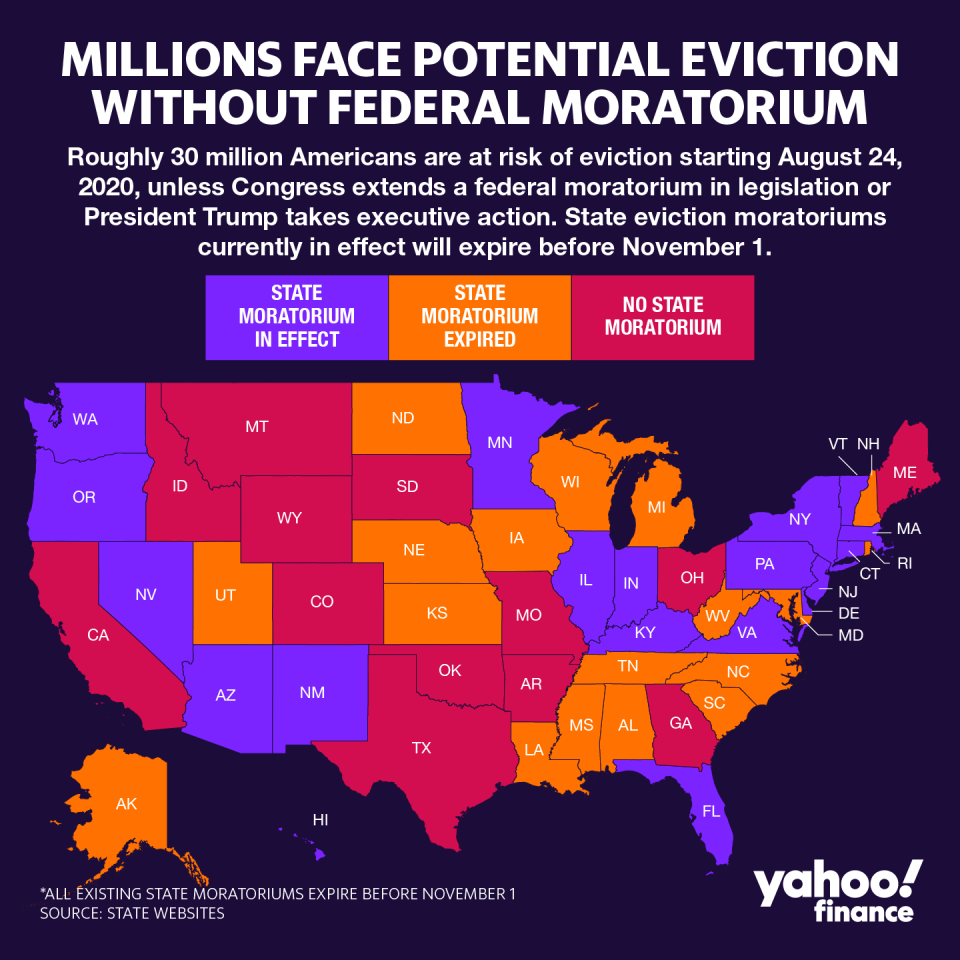Coronavirus stimulus: No action yet on Trump's executive order on evictions
More than two weeks after President Donald Trump issued an executive order directing federal agencies to address evictions during the pandemic, it appears no progress has been made in preventing struggling Americans from losing their homes.
It also remains uncertain if the agencies can even legally carry out the president’s directives at all.
The timing is important because Aug. 24 marks the first day that landlords with federally backed mortgages can begin evicting their tenants, following a 30-day notice that started on July 24, when the federal eviction moratorium expired.
An estimated 30 to 40 million Americans are at risk of eviction over the next several months, according to The Aspen Institute, a nonpartisan think tank.
“[We have] been unable to identify any action from the relevant agencies that responds to the president’s executive order,” said Noëlle Porter, director of government affairs at the National Housing Law Project, a housing and legal advocacy nonprofit. “From what we understand, members of Congress who inquired about next steps at HUD were told that the agency is already doing everything it can to address the crisis.”

Congress and White House need ‘to come back to the negotiating table’
In the executive order signed on Aug. 8, Trump requested the Centers of Disease Control and Prevention (CDC), the Department of Housing and Urban Development (HUD), and the Department of Health and Human Services (HHS) to consider several actions to alleviate a potential eviction crisis.
But none responded to repeated requests from Yahoo Money, asking what concrete steps had been taken. The White House also didn’t provide an update.
The National Multifamily Housing Council, which represents apartment owners, also hasn’t received any guidance “beyond the initial order,” said Collin Dunn, communication director of policy and advocacy at the NMHC.
“We need Congress and the administration to come back to the negotiating table and come to some real solution,” he said.

‘Serious reasons to doubt constitutional authority’
In the executive order, President Trump directed the HHS secretary and the CDC director to “consider whether any measures temporarily halting residential evictions of tenants for failure to pay rent are reasonably necessary to prevent the further spread of COVID-19.”
But the National Housing Law Project found that the HHS itself lacks the legal authority to enact moratoriums. That responsibility would fall on the HUD, which runs rental assistance programs; the Department of Treasury, which carries out the low-income housing tax credit; and the Agriculture Department (USDA), which oversees an affordable housing program in rural communities.
“HHS does not have the authority to issue an eviction moratorium. The only thing they’d be able to come back and say is that we recommend a moratorium based on our analysis,” Porter said. “The authority to issue a moratorium would come back to HUD, the Treasury secretary and the USDA.”
NHLP Letter to HUD July 2020 by Aarthi on Scribd
In July, the NHLP and the National Low-Income Housing Coalition sent a letter to HUD with 168 signatures, presenting a call-to-action for HUD to enact its own eviction moratorium to protect low-income renters in the absence of additional legislation from Congress.
In response, HUD’s legal counsel sent a rebuttal, saying that the HUD secretary doesn’t have legal authority to enact an eviction moratorium.
‘Ordered HUD to look under the cushion’
Additionally, the executive order directs the Treasury secretary and HUD secretary to “identify any and all available Federal funds to provide temporary financial assistance to renters and homeowners who, as a result of the financial hardships caused by COVID-19, are struggling to meet their monthly rental or mortgage obligations.”
But HUD cannot appropriate funds without congressional approval, Porter said.
“One of the things that the administration was trying to get around is that they can’t fund any new initiatives, so basically they ordered HUD to look under the cushion to illegally appropriate funds directed by Congress,” Porter said. “The President can instead issue a state of emergency in any specific area, but he has not done so in the case of evictions.”
In the meantime, Porter and the NLIHC have sent follow-up letter to HUD as well as new letters to the secretaries of the USDA and Treasury, requesting they take action on evictions immediately, among other concerns.
NHLP Follow Up Letter to HUD August 2020 by Aarthi on Scribd
At risk is a potential tens of millions of evictions by the end of the year, Porter said, not to mention landlords who will lose a lot of money.
“The eviction moratorium would stop the economic crisis for renters,” Porter said, “and bleeding for landlords.”
Dhara is a reporter Yahoo Money and Cashay. Follow her on Twitter at @Dsinghx.
Read more:
Read the latest financial and business news from Yahoo Finance and Yahoo Money
Follow Yahoo Finance on Twitter, Facebook, Instagram, Flipboard, SmartNews, LinkedIn, YouTube, and reddit.

 money
money 
